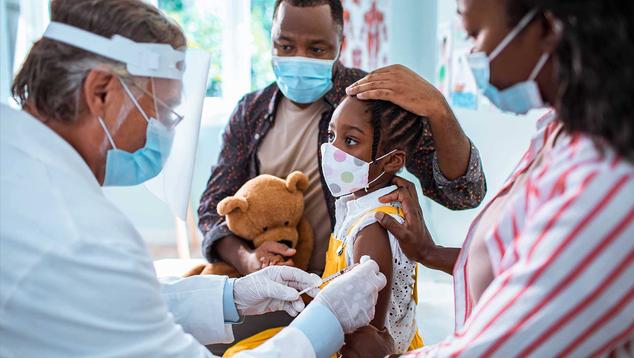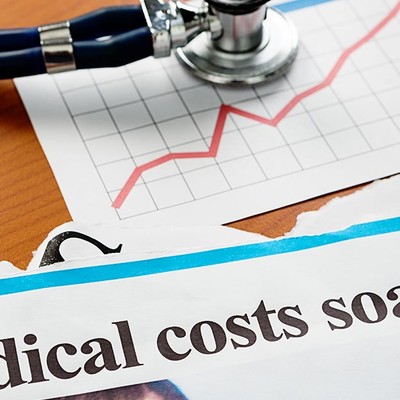Story Highlights
- 30% now report forgoing treatment in prior three months due to cost of care
- Half of adults have worse views of U.S. healthcare system due to COVID-19
- Pandemic raises concerns of unequal access to care for some Americans
Editor's Note: The research below was conducted in partnership between West Health and Gallup.
WASHINGTON, D.C. -- Amid sharply rising inflation, the percentage of U.S. adults who report forgoing treatment for a health problem in the prior three months due to the cost of care has increased to 30%, according to a major new study by West Health and Gallup. Reports of being unable to pay for prescribed medicine in the prior three months, in turn, have risen to 14% during the same time span.
| Did not seek treatment | Was unable to pay for medicine | |
|---|---|---|
| % | % | |
| Mar 2021 | 10 | 6 |
| Jun 2021 | 14 | 7 |
| Sep-Oct 2021 | 30 | 14 |
| West Health/Gallup | ||
These surveys were conducted by web March 15-21, June 14-20, and over successive field periods of Sept. 27-30 and Oct. 18-21, 2021, with adults aged 18 and older, living in all 50 U.S. states and the District of Columbia via the Gallup Panel, a probability-based, non-opt-in panel of about 120,000 adults nationwide. The September/October results were obtained on a West Health survey solely asking about healthcare issues, whereas the March and June measurements were asked toward the end of Gallup's ongoing coronavirus pandemic tracking survey.
Full results of the new study can be found in the West Health-Gallup 2021 Healthcare in America Report, which provides a comprehensive look at Americans' changing attitudes, behaviors and trends related to healthcare during the second year of the COVID-19 pandemic. The report highlights the outsized effect the ongoing pandemic appears to have had on public attitudes toward healthcare.
COVID-19 Worsens Views of U.S. Healthcare System
Americans say the COVID-19 pandemic has increased their worry about the cost of healthcare services, and to a lesser extent, the cost of prescription drugs. About six in 10 U.S. adults (59%) report that they are more worried about the cost of healthcare services due to the pandemic, and another 45% say they are more worried about the cost of prescriptions. Less than 5% are now less worried about each because of COVID-19.
| More worried | About the same | Less worried | |
|---|---|---|---|
| % | % | % | |
| Cost of healthcare services | 59 | 38 | 2 |
| Cost of prescription drugs | 45 | 52 | 3 |
| West Health/Gallup | |||
Amid substantial levels of worry about costs brought on by the pandemic, nearly half of Americans (48%) report that COVID-19 has worsened their view of the U.S. healthcare system, while 7% say COVID-19 has improved it. These deteriorating opinions hold true across age groups but are particularly acute among adults younger than 40.
| U.S. adults | 18-29 | 30-39 | 40-49 | 50-64 | 65+ | |
|---|---|---|---|---|---|---|
| % | % | % | % | % | % | |
| Yes, my view of the U.S. healthcare system is better. | 7 | 7 | 4 | 5 | 9 | 12 |
| Yes, my view of the U.S. healthcare system is worse. | 48 | 58 | 55 | 52 | 42 | 38 |
| No, my view of the U.S. healthcare system has not changed. | 40 | 32 | 38 | 39 | 44 | 44 |
| Don't know | 4 | 3 | 3 | 3 | 5 | 6 |
| West Health/Gallup | ||||||
The pandemic has also exposed perceived inequities in the healthcare system. Six in 10 Americans (60%) say that due to COVID-19, they are more concerned that some Americans have unequal access to quality care. This level of concern rises to 74% among Black Americans and to 68% among Hispanic Americans.
Six percent of Americans say they are less concerned about inequities because of COVID-19.
| More concerned | Same level of concern | Less concerned | |
|---|---|---|---|
| % | % | % | |
| U.S. adults | 60 | 34 | 6 |
| Men | 53 | 39 | 8 |
| Women | 67 | 30 | 4 |
| White adults | 56 | 39 | 6 |
| Black adults | 74 | 21 | 5 |
| Hispanic adults | 68 | 27 | 5 |
| West Health/Gallup | |||
Healthcare in America: Key Report Findings
The major new report from West Health and Gallup is based on the findings from a nationally representative sample of more than 6,600 American adults and is among the largest surveys measuring the state of healthcare in America during the second year of the pandemic. Additional key findings include:
- An estimated 58 million U.S. adults (23%) report that healthcare costs are a major financial burden for their family. The financial burden is especially acute for younger Americans (under 50) and households with a yearly income below $48,000.
- Seven in 10 Americans (71%) agree that their household pays too much for the quality of healthcare they receive.
- Almost a third of adults (30%) say they would not have access to affordable care if they needed it today, up from 18% in February and 22% in June. In addition, 42% are concerned they will be unable to pay for needed healthcare services in the next year.
- A racial divide exists in suffering serious consequences of skipping critical care. One in every 20 U.S. adults -- an estimated 12.7 million people -- report knowing a friend or family member who died this past year after not receiving treatment because they could not afford it. Black adults (8%) are twice as likely as White adults (4%) to know someone who died.
- Two-thirds of Americans (66%) think voters have very little to no power in reducing the cost of healthcare in the U.S., but nearly nine in 10 think American businesses, corporations and Congress do.
- However, more than two-thirds of Americans, regardless of party affiliation, say they are pessimistic about the federal government enacting policies to reduce healthcare costs in the coming year.
Implications
Several major indicators of Americans' wellbeing have worsened in recent months. An increasing percentage of adults are citing economic issues, including inflation, as the most important problem facing the nation. Gallup's Economic Confidence Index, in turn, fell from +2 in April to -25 in October, its lowest mark since April 2020. And satisfaction with the way things are going in the United States has slid from 34% to 23% during the same period. Dovetailing with these general attitudes, the worsening trends in Americans' ability to afford healthcare underscore the urgency of addressing the cost of care in the U.S. today and the dire projections for the coming years.
Many factors likely contribute to the recent changes, most of them pandemic-related. The cost of COVID-19 care for which consumers are responsible is rising, Kaiser Family Foundation recently reported, as 72% of major health insurers have moved to require members to pay more for COVID-19 treatment. That, coupled with the major summer surge in hospitalizations, has resulted in much more money paid out of pocket for affected Americans and much less money available for other household expenses.
Reports also suggest that deferred elective care from 2020 is now occurring in 2021, driving up healthcare utilization generally and increasing costs. And amid these issues is a worsening nurse shortage nationally that predated the pandemic but has significantly worsened because of it, forcing health systems in 2021 to increase salaries and hiring bonuses as a means of attracting and retaining nurses -- practices that can also result in greater costs for consumers.
The pandemic has likely played a significant role in the cost crisis in other ways, including disruptions in the global supply chain that have sharply increased inflation. The personal consumption expenditures (PCE) price index -- a key measure of inflation -- hit a 30-year high in August, according to the U.S. Bureau of Economic Analysis, and has substantially outpaced more slowly rising American incomes. As consumers are spending more on basic food items, utilities and gasoline -- causing hardship for 45% of households -- the effects of simultaneously rising costs of care are likely exacerbating their ability to afford it. Medical devices and medical technology that are dependent on chips and semiconductors to power devices are increasing in price as well due to pandemic-driven global supply-chain shortages in 2021.
Money to spend on healthcare has also dwindled in recent months. According to a study by NPR/Robert Wood Johnson Foundation/Harvard T.H. Chan School of Public Health, 38% of U.S. households have suffered serious financial problems in the past few months.
Taken together, 2021 will likely be seen as a year when addressing the cost of care in the U.S. took on a new urgency and importance, setting the stage for policy leaders to choose between legislating real change or maintaining the status quo -- potentially further eroding the ability of Americans to afford both needed medicine and care.
Learn more about how the Gallup Panel works.





